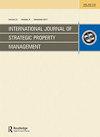Resilient Supply Chains in the Face of Disruptions: An In-Depth Study of Strategies Employed by U.S. Companies to Ensure Business Continuity
IF 1.7
4区 管理学
Q3 MANAGEMENT
International Journal of Strategic Property Management
Pub Date : 2023-10-22
DOI:10.53819/81018102t4199
引用次数: 0
Abstract
This study retrospectively explores the strategies employed by U.S. companies to ensure business continuity in the face of disruptions within their supply chains. The purpose of this research was to investigate the effectiveness of various resilience strategies adopted by American businesses and to derive insights that can inform future supply chain management practices. The problem addressed in this study was the increasing vulnerability of supply chains to disruptions, including natural disasters, global pandemics, and geopolitical tensions. These disruptions could result in significant economic losses and operational challenges for businesses. Understanding how U.S. companies tackled these challenges in the past provides valuable lessons for enhancing supply chain resilience. To achieve these objectives, a mixed-methods research approach was employed. Quantitative data were collected through surveys distributed to a diverse sample of U.S. companies across different industries. Qualitative data were obtained through in-depth interviews with supply chain and operations managers from a subset of these companies. The study analyzed historical cases of supply chain disruptions and the corresponding strategies used to mitigate their impact. Findings from this research indicate that U.S. companies employed a combination of strategies to enhance supply chain resilience, including diversifying suppliers, leveraging technology for real-time visibility, and implementing risk management frameworks. Companies that had robust business continuity plans in place were better equipped to respond to disruptions effectively. In conclusion, this study highlights the critical importance of proactive supply chain resilience strategies in mitigating the impact of disruptions. The lessons learned from past disruptions provide valuable insights for companies seeking to build more resilient supply chains in the future. Recommendations include the development and regular testing of robust business continuity plans, the adoption of digital technologies for enhanced visibility, and a proactive approach to risk management. By drawing from past experiences, U.S. companies can better prepare for and respond to future disruptions, ultimately ensuring the continuity of their operations and safeguarding their competitiveness in an ever-changing business landscape. Keywords: Resilient Supply Chains, Disruptions, U.S. Companies, Business Continuity, Strategies面对中断的弹性供应链:对美国公司确保业务连续性所采用战略的深入研究
本研究回顾性地探讨了美国公司在面对供应链中断时确保业务连续性所采用的策略。本研究的目的是调查美国企业采用的各种弹性策略的有效性,并得出可以为未来供应链管理实践提供信息的见解。本研究解决的问题是供应链越来越容易受到中断的影响,包括自然灾害、全球流行病和地缘政治紧张局势。这些中断可能会给企业带来重大的经济损失和运营挑战。了解美国公司过去是如何应对这些挑战的,为提高供应链的弹性提供了宝贵的经验。为了实现这些目标,采用了混合方法研究方法。定量数据是通过对不同行业的不同样本的美国公司进行调查收集的。定性数据是通过对这些公司的一部分的供应链和运营经理进行深入访谈获得的。该研究分析了供应链中断的历史案例以及用于减轻其影响的相应策略。这项研究的结果表明,美国公司采用了多种策略来增强供应链的弹性,包括使供应商多样化,利用技术实现实时可见性,以及实施风险管理框架。拥有强大业务连续性计划的公司能够更好地有效应对中断。总之,本研究强调了主动供应链弹性战略在减轻中断影响方面的关键重要性。从过去的中断中吸取的教训为寻求在未来建立更具弹性的供应链的公司提供了宝贵的见解。建议包括制定和定期测试稳健的业务连续性计划,采用数字技术提高可见性,以及采取主动的风险管理方法。通过吸取过去的经验,美国公司可以更好地为未来的中断做好准备和应对,最终确保其运营的连续性,并在不断变化的商业环境中维护其竞争力。关键词:弹性供应链,中断,美国公司,业务连续性,战略
本文章由计算机程序翻译,如有差异,请以英文原文为准。
求助全文
约1分钟内获得全文
求助全文
来源期刊
CiteScore
4.00
自引率
18.50%
发文量
23
审稿时长
15 weeks
期刊介绍:
International Journal of Strategic Property Management is a peer-reviewed, interdisciplinary journal which publishes original research papers. The journal provides a forum for discussion and debate relating to all areas of strategic property management. Topics include, but are not limited to, the following: asset management, facilities management, property policy, budgeting and financial controls, enhancing residential property value, marketing and leasing, risk management, real estate valuation and investment, innovations in residential management, housing finance, sustainability and housing development, applications, etc.

 求助内容:
求助内容: 应助结果提醒方式:
应助结果提醒方式:


